The hall attached to St Cuthbert’s Church is peaceful enough to hear the clock tick towards 2pm. That, and the gentle roar of a boiling kettle aside, the room is silent.
The peace doesn’t last long. Within five minutes of the doors swinging open, a capacity crowd fills the space with excited nattering. Neighbours, couples, and parents with their children have arrived at this enclosed space to play cricket. Only this is not cricket as most know it. This is Clock Cricket, a format almost entirely based on one simple concept: inclusivity.
“Cricket is doing brilliant work within inclusion,” Sean Carey, a burly former policeman tells The Cricket Paper ahead of delivering one of his ten sessions in the week. “But it forgets about one sector of society. The people we work with every day can’t get into stadiums to watch cricket.”
Not on Clock Cricket’s watch. This group is for people living – and living well – with dementia and their carers. The game is also taken to stroke recovery units and residential homes by a six-strong team. For each of them, work is as much a passion project as it is a way to make a living.
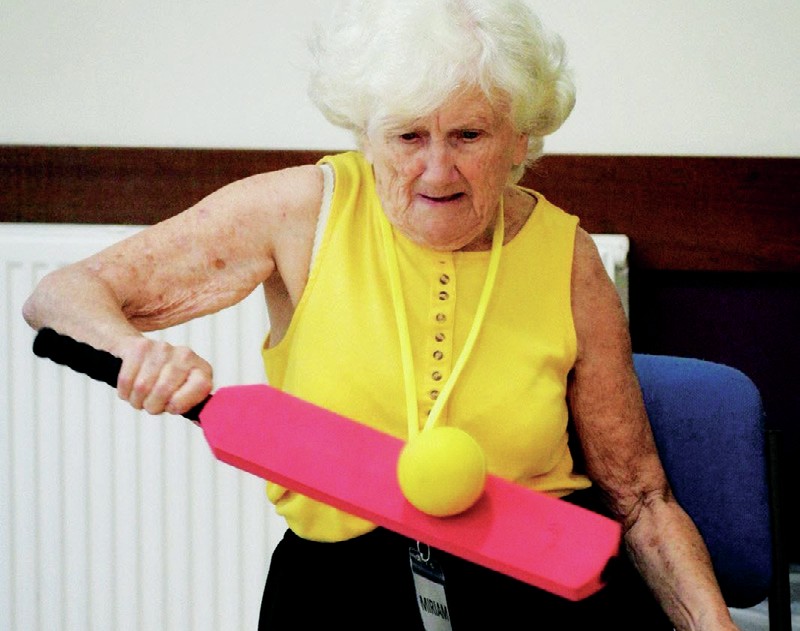
Before the cricket starts, the attendees swig tea and socialise over a biscuit or three. It is a vital part of the afternoon, and the Clock Cricket team pride themselves on being present before the first brew is poured.
“This is about bringing people together and having a laugh,” explains Kerryn Atkins, who runs this weekly group for Hertswise, a dementia service in Hertfordshire. “Quite often, when someone is diagnosed with dementia, they get isolated from their friendship groups.”
Cricket is just one of a carousel of activities, but “the biggest thing is consistency,” says Atkins. “We are ‘same time, same place’ every week.”
Soon, tables are being re-located around the room’s edges.
Chairs are rearranged into a pair of neat rows facing inwards. “We do that to keep everyone engaged,” Carey says.
A quick warm-up entails sponge balls being bounced across the room in pairs. Then play is called. The laws?
A batter faces six balls from the bowler, who is sat opposite them.
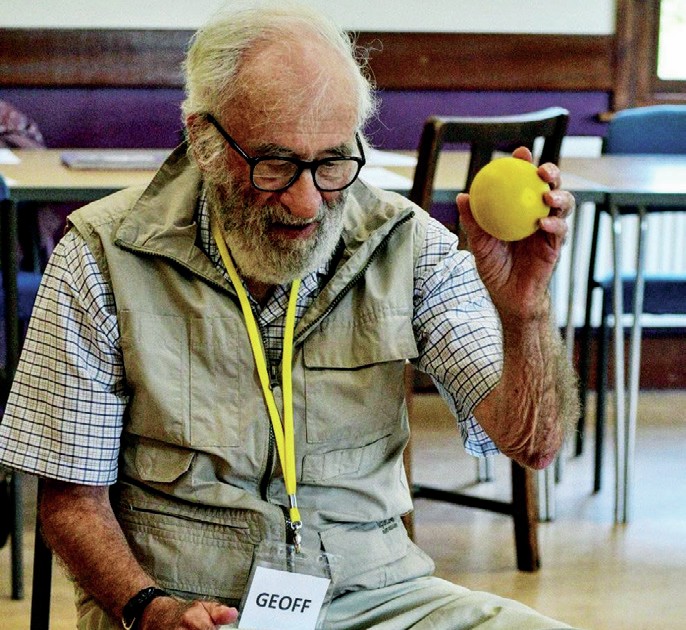
Down the line they go, and then back up with it. Four runs are scored if the wall is hit, while six is added for reaching the ceiling. Ten comes if a facilitator is struck, while Carey is innovative (and generous) with his improvised scoring.
Being caught by a seated fielder loses the team five, and a single is awarded for bat and ball making contact. “Nobody ever scores nought,” says Carey winking. “There will always be a little inside edge!”
What is striking is how comfortable the group are in each other’s company. The spirit of cricket oozes out. There are few inhibitions, with everyone present joining in. “That’s one of my rules,” Carey tells TCP. “I was in a stroke ward once and two people in suits came in. I told them ‘You can’t just stand there. If you’re in the room, you’re playing.’ Turned out it was the Clinical Director!”
But that is not the real victory here. No, that lies in the momentary unfiltered joy when a husband’s eyes sparkle when he catches his wife’s stare. And it lies in the cackles of laughter that fill the room as ceiling lights and body parts are peppered
Clock Cricket is the brainchild of Richard Hill, the ECB’s Events and Competition manager for Disability Cricket. He and Carey first met while the latter was working at Glamorgan alongside their third partner Tony Davies – uncle of Middlesex wicketkeeper Jack.
They stayed in touch and when Carey returned to Hertfordshire during lockdown, they came together to push the game forward. Initially reliant on a couple of large tenders, they now run sessions in Essex, Suffolk, Hertfordshire, Bedfordshire and south Wales, via dozens of organisations.
Carey is full of praise for Worcestershire Cricket Foundation, who are close partners, and Sussex, where a taster session is pencilled in for September.
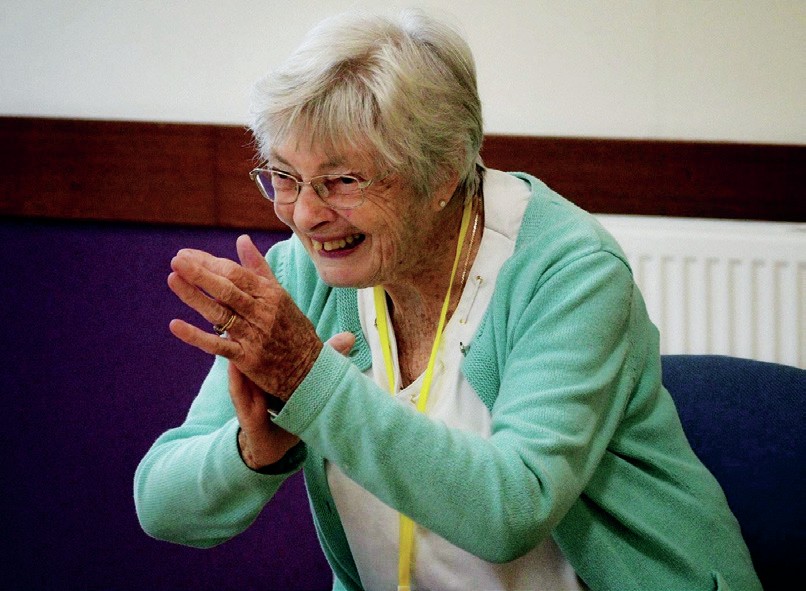
Carey estimates that they had 4,000 participants in 2023 – a number set to rise significantly this year. Securing funding will help further growth, as would exploratory talks with professional football and rugby clubs coming to fruition. “We knew we had something really special,” Carey admits, before adding that minimal equipment is needed. All he needs fits neatly into a bag that would be waved onto an aeroplane cabin. Foam bats and balls plus a few red cones – the colour is thought to be a brain stimulant for those living with dementia.
At close, an anticipatory hush descends. The Undecideds have trumped the Ragged A*$£ Rovers, both names of the players’ choosing. But that is not the real victory here. No, that lies in the momentary unfiltered joy when a husband’s eyes sparkle when he catches his wife’s stare. And it lies in the cackles of laughter that fill the room as ceiling lights and body parts are peppered.
“For us this is about husband and wife, son and daughter – not client and carer,” explains Atkins. “Quite often with dementia, while the memory goes, the emotion stays. Someone might not remember a name or where they are, but the emotion they felt will carry through. We want everyone to feel good in this environment.”
“People thank us, sometimes, for bringing their husband or wife back for a little while,” says Carey. “At least once a week I get in my car after a session and have a little sob.” For Carey, work – which he regards as a “privilege” – is personal. Likewise for Hill. Both their fathers passed away in care homes after a period living with dementia. “I got really sick of going into the home and Dad would be sitting in the day room with Jeremy Kyle blaring out. There just weren’t enough staff to do anything with the residents.
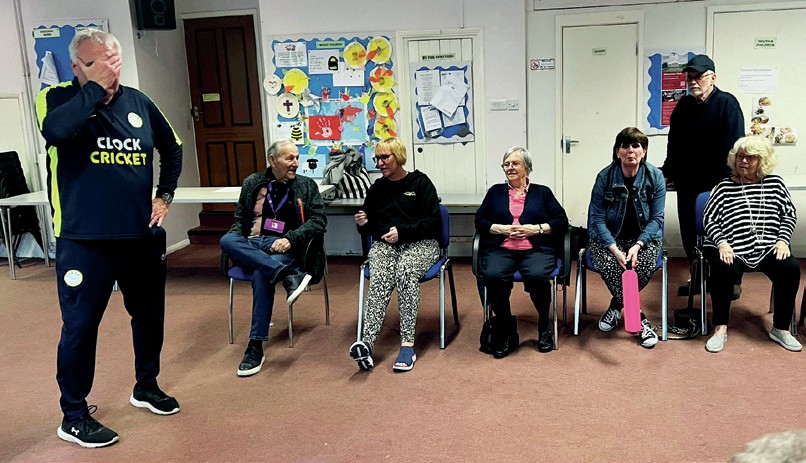
“We go in and we’ll throw a ball at people, we’ll give them some exercise and make them happy for an hour.”
Framed that way, Clock Cricket’s work sounds simple. In many ways it is. But beauty can be found in simplicity, and no one can deny that what happens within these four walls is anything but special.
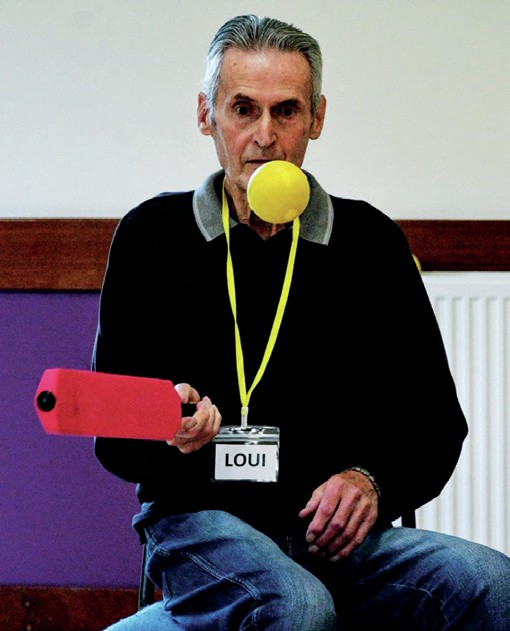
For exclusive stories and all the detailed cricket news you need, subscribe to The Cricket Paper website, digital edition, or newspaper from as little as 14p a day.












